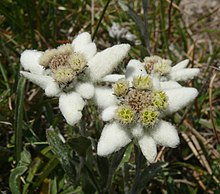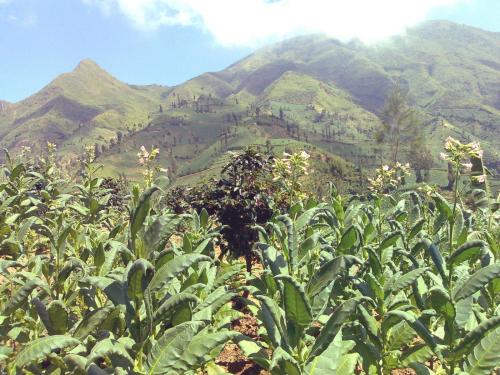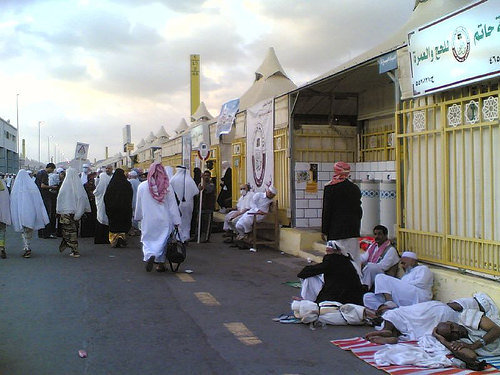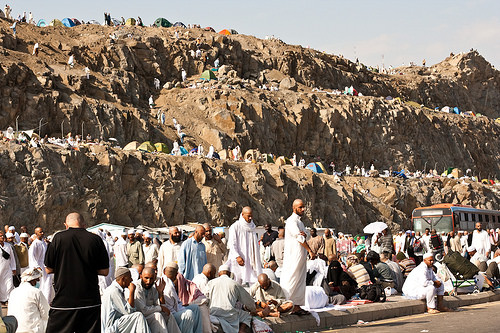Whenever My Late Father passed by the big old tree at Paya Lebar on His way home at night during the 60s, He said, from his bicycle, He would looked up at the creepy gigantic tree searching and looking out for its resident.
Then He would looked down for any recent falling down leaves as it was said to be the indication that its resident was up on the tree.
Often He picked up the latest fallen leaves blown by wind for signs (?)
My Late father had never seen the real tenant of the tree, which underneath was an altar placed there by the Chinese staying nearby, but many men around my neighbourhood did meet the lady resident, said to be a female vampire or 'pontianak'.
The creature, with unkempt flowing black hair and draping a long white clothing would sit on one of the many outstretched winding branches with feet dangling in the air that would scare men away, often leaving their bicycles and ran for their life.
If they were to continue cycling, most likely 'the lady' would hitch a ride to the men's home.
But thinking back, 'pontianak', according to folklore is a woman who dies during childbirth.
They are said to be most likely associated with banana trees and we had many banana trees near the kitchen as banana trees are rhizome that multiply quickly.
Thank GOD, none of them like to stay at the banana trees not far from my kitchen door.
Maybe, what we had then, were not the ordinary banana trees which we normally eat the fruits, but My Father planted 'pisang batu' (not sure of the exact English name, but is translated to be stoned banana) more for the leaves to be used for making 'lontong' or rice cake for 'Aidilfitri.
My Mother preferred the leaves of 'pisang batu' as it is known to be thicker, stronger and very unlikely to be easily torn apart.
Unlike ordinary banana, the fruit of 'pisang batu' is with hard black seed.
When the seeds of an apple is easily crunched, the splattered seeds found in ripe 'pisang batu', which can be up to 4mm, just could not be broken into pieces with our teeth, hence its name, 'batu' or stone.
But the young 'pisang batu' with seeds still soft, is usually used for 'rojak', mixed local fruits and fried bean curds, mixed with grounded fried nuts, chillies, shrimp paste, thick tamarind juice and palm sugar.
I had blogged here that My Father had once asked one of the older generation of the unseen creature staying at Kaki Bukit to move out when he took revenge on My Nephew, who was a toddler then, for playing with sticks.
The unseen grandfather with his generations of families were once trees' dwellers living on the hill top, before Kaki Bukit was levelled and big trees were cleared, to make way for Singapore's public housing.
After their 'houses' were uprooted, some of them stayed behind, then stay with and among the residents of Housing and Development Board.
When My Mother was visiting the pleasant and cool mountainous Wonosobo regency, 150 km from Yogyakarta regency, located in Dieng, she 'saw' many teenagers, boys and girls, in white attires, busied themselves with their books and studies, in the thick forest.
The word Wonosobo or 'Wanasaba' in Javanese, is derived from the Sanskrit word 'Vanasabha' means 'forest gathering place'.
Interestingly, not everybody in her group saw the same scene as her.
To many of them, they were just on one of the Indonesian plateau, which is 2,000 metres above the sea.
Although I had never been there, but while on my way up to Temanggung, 40 km east of Wonosobo, from Temanggung, which is 340 metres higher than Wonosobo, Wonosobo is like a regency floating on thick cottony clouds.
Temanggung is said to be a place above the clouds, and is being sandwiched by two mountains,

Sindoro and Sumbing. Source: Ida 08's Weblog
Sindoro at its south, and at the north is Sumbing.
Locals said both mountains putting on white caps all year round - as they were always covered with clouds.
The second highest mountain in central Java, the 3371 metres Mount Sumbing, was as if just within my reach.
Unlike other mountains, Sumbing nearing to the summit, is with no big and tall trees, just tall grasses,

and edelweiss plants.
The mountain has one of the most Indonesian landslides occurrences as its lower slopes, reaching 2 km uphill had been exploited of its natural vegetation.
Slopes are covered with some vegetable farms,
Tobacco Plantation. Source: Temanggung City
but mostly tobacco, as almost 80% of Indonesian tobacco comes from Temanggung, as tobacco is best planted at 1,000 metres above the ground.
Luckily all my way up to Temanggung,
 the refreshing surrounding air was with the awakening aroma of fresh coffee.
the refreshing surrounding air was with the awakening aroma of fresh coffee.
The regency produce one of the best Indonesian coffee, as with its first grade tobacco leaves, both commodities brought to Temanggung in around 1630s by the Dutch, although tobacco smoking had been around in Java since 1613, during the Mataram Sultanate.
Hikers climbing Mount Sumbing were strongly warned of do's and don't while hiking.
They are to respect the culture of local folks and nature, always to stay friendly among friends, other hikers and those staying at the mountain, not to pluck, even a stalk of flower before prior written consent, not to ease themselves at the high altitude freely, and ... never to sigh!
As was told by the hiker himself, it was in the early 2000 that he climbed Sumbing with four others when he felt the urgency to answer nature call.
 In a big open space at 2,437 feet above ground, known for its strong and dangerous wind, at Mount Sumbing is a place named 'Pasar Setan' - Satan's Market.
In a big open space at 2,437 feet above ground, known for its strong and dangerous wind, at Mount Sumbing is a place named 'Pasar Setan' - Satan's Market.
Locals, who are mostly farmers, ritually go up to Sumbing summit on the 20th Ramadhan after breaking their fast, spending their 'Malam Selikoran', the first night in the last ten days of Ramadhan, visiting the graveyard of Ki Ageng Makukuban at the summit.
He is said to be the first man to stop at Kedu Plain, between the two husband (Sumbing) and wife (Sundoro) mountains and the pioneer of the tobacco plantation.
Since the annual '20th Ramadhan' going uphill is performed by almost all of the local community since many generations ago, local youths used to hiking, Sumbing Hiking Club, Search And Rescue Team and police force oversee the folks orderliness and safety.
Some of the local folks and hikers would hear the Indonesian musical ensemble 'gamelan' being played at 'Pasar Setan' where the above hiker had taken his rest with 'four others', especially when the sun is about to end its day duty.
These local folks and hikers too, were advised to stay close with their group when hearing the 'gamelan', lest they were to be swayed by the musical beat and entered into 'another world'.
Hikers staying for their nights near and around 'Pasar Setan', as the open space is a good site for tents building, would often 'see busy and noisy market'.
If they smell the surrounding of strong fragrance, it was said these creatures were very near to them.
Those who went up the mountain at night and, if they were to be separated from their team, would most often find themselves being escorted by a person, who usually put on white attire, until he or she is being united with their team again.
Unfortunately, the 'person' never answer questions posed to him or her.
This 'person' always appear to be the same sex, and around the same age as the hiker and the said 'person' remain silent through out its good intention of bringing back the lost hiker to the team.
Meeting 'the good hearted soul' in white is said to be better while hiking up or down Mount Sumbing, rather than meeting what the local folks called 'Setan Belanda' - eerie looking, big sized 'Dutch's Satan', who is sometime found among pine trees not far from the villages.
'Pasar Setan' is not only found at Mount Sumbing, it can be be found at any Indonesian mountains.
The known Mount Merapi with its famous 'Pasar Setan' named 'Pasar Bubrah', has its own story to tell.
.
Then He would looked down for any recent falling down leaves as it was said to be the indication that its resident was up on the tree.
Often He picked up the latest fallen leaves blown by wind for signs (?)
My Late father had never seen the real tenant of the tree, which underneath was an altar placed there by the Chinese staying nearby, but many men around my neighbourhood did meet the lady resident, said to be a female vampire or 'pontianak'.
The creature, with unkempt flowing black hair and draping a long white clothing would sit on one of the many outstretched winding branches with feet dangling in the air that would scare men away, often leaving their bicycles and ran for their life.
If they were to continue cycling, most likely 'the lady' would hitch a ride to the men's home.
But thinking back, 'pontianak', according to folklore is a woman who dies during childbirth.
They are said to be most likely associated with banana trees and we had many banana trees near the kitchen as banana trees are rhizome that multiply quickly.
Thank GOD, none of them like to stay at the banana trees not far from my kitchen door.
Maybe, what we had then, were not the ordinary banana trees which we normally eat the fruits, but My Father planted 'pisang batu' (not sure of the exact English name, but is translated to be stoned banana) more for the leaves to be used for making 'lontong' or rice cake for 'Aidilfitri.
My Mother preferred the leaves of 'pisang batu' as it is known to be thicker, stronger and very unlikely to be easily torn apart.
Unlike ordinary banana, the fruit of 'pisang batu' is with hard black seed.
When the seeds of an apple is easily crunched, the splattered seeds found in ripe 'pisang batu', which can be up to 4mm, just could not be broken into pieces with our teeth, hence its name, 'batu' or stone.
But the young 'pisang batu' with seeds still soft, is usually used for 'rojak', mixed local fruits and fried bean curds, mixed with grounded fried nuts, chillies, shrimp paste, thick tamarind juice and palm sugar.
******
I had blogged here that My Father had once asked one of the older generation of the unseen creature staying at Kaki Bukit to move out when he took revenge on My Nephew, who was a toddler then, for playing with sticks.
The unseen grandfather with his generations of families were once trees' dwellers living on the hill top, before Kaki Bukit was levelled and big trees were cleared, to make way for Singapore's public housing.
After their 'houses' were uprooted, some of them stayed behind, then stay with and among the residents of Housing and Development Board.
******
When My Mother was visiting the pleasant and cool mountainous Wonosobo regency, 150 km from Yogyakarta regency, located in Dieng, she 'saw' many teenagers, boys and girls, in white attires, busied themselves with their books and studies, in the thick forest.
The word Wonosobo or 'Wanasaba' in Javanese, is derived from the Sanskrit word 'Vanasabha' means 'forest gathering place'.
Interestingly, not everybody in her group saw the same scene as her.
To many of them, they were just on one of the Indonesian plateau, which is 2,000 metres above the sea.
Although I had never been there, but while on my way up to Temanggung, 40 km east of Wonosobo, from Temanggung, which is 340 metres higher than Wonosobo, Wonosobo is like a regency floating on thick cottony clouds.
******
Temanggung is said to be a place above the clouds, and is being sandwiched by two mountains,

Sindoro and Sumbing. Source: Ida 08's Weblog
Sindoro at its south, and at the north is Sumbing.
Locals said both mountains putting on white caps all year round - as they were always covered with clouds.
The second highest mountain in central Java, the 3371 metres Mount Sumbing, was as if just within my reach.
Unlike other mountains, Sumbing nearing to the summit, is with no big and tall trees, just tall grasses,

and edelweiss plants.
The mountain has one of the most Indonesian landslides occurrences as its lower slopes, reaching 2 km uphill had been exploited of its natural vegetation.
Slopes are covered with some vegetable farms,
Tobacco Plantation. Source: Temanggung City
but mostly tobacco, as almost 80% of Indonesian tobacco comes from Temanggung, as tobacco is best planted at 1,000 metres above the ground.
Luckily all my way up to Temanggung,
 the refreshing surrounding air was with the awakening aroma of fresh coffee.
the refreshing surrounding air was with the awakening aroma of fresh coffee.The regency produce one of the best Indonesian coffee, as with its first grade tobacco leaves, both commodities brought to Temanggung in around 1630s by the Dutch, although tobacco smoking had been around in Java since 1613, during the Mataram Sultanate.
Hikers climbing Mount Sumbing were strongly warned of do's and don't while hiking.
They are to respect the culture of local folks and nature, always to stay friendly among friends, other hikers and those staying at the mountain, not to pluck, even a stalk of flower before prior written consent, not to ease themselves at the high altitude freely, and ... never to sigh!
As was told by the hiker himself, it was in the early 2000 that he climbed Sumbing with four others when he felt the urgency to answer nature call.
He told them to proceed with their hiking and he would catch them up.
When he had done among the bushes, he emerged, and saw that his four friends were still waiting for him.
True friends indeed.
They chatted and joke away until they reached an open space of only grass field, when his four friends suggested taking a break.
True friends indeed.
They chatted and joke away until they reached an open space of only grass field, when his four friends suggested taking a break.
The five of them shared their food and supplement drinks.
When he was about to finish puffing his first cigarette, he heard his name being called again and again, from a great distant, until the voice came nearer and clearer.
He was shocked and surprised to hear the voice of two of his hiking friends.
Are not they with him then, at the open space of only green grass field?
Why were their voices seemed faraway?
He looked behind where his four friends were resting themselves...
It was empty!
Nobody was sitting or standing around except himself.
With raised hair, lost mind and soft limbs, slowly he left the haunted place and, despite stumbles, he followed the direction from where his name was being called.
He ran as fast as he could, despite hurdles, darkness, stones and ravine...
******
 In a big open space at 2,437 feet above ground, known for its strong and dangerous wind, at Mount Sumbing is a place named 'Pasar Setan' - Satan's Market.
In a big open space at 2,437 feet above ground, known for its strong and dangerous wind, at Mount Sumbing is a place named 'Pasar Setan' - Satan's Market.Locals, who are mostly farmers, ritually go up to Sumbing summit on the 20th Ramadhan after breaking their fast, spending their 'Malam Selikoran', the first night in the last ten days of Ramadhan, visiting the graveyard of Ki Ageng Makukuban at the summit.
He is said to be the first man to stop at Kedu Plain, between the two husband (Sumbing) and wife (Sundoro) mountains and the pioneer of the tobacco plantation.
Since the annual '20th Ramadhan' going uphill is performed by almost all of the local community since many generations ago, local youths used to hiking, Sumbing Hiking Club, Search And Rescue Team and police force oversee the folks orderliness and safety.
Some of the local folks and hikers would hear the Indonesian musical ensemble 'gamelan' being played at 'Pasar Setan' where the above hiker had taken his rest with 'four others', especially when the sun is about to end its day duty.
These local folks and hikers too, were advised to stay close with their group when hearing the 'gamelan', lest they were to be swayed by the musical beat and entered into 'another world'.
Hikers staying for their nights near and around 'Pasar Setan', as the open space is a good site for tents building, would often 'see busy and noisy market'.
If they smell the surrounding of strong fragrance, it was said these creatures were very near to them.
******
Those who went up the mountain at night and, if they were to be separated from their team, would most often find themselves being escorted by a person, who usually put on white attire, until he or she is being united with their team again.
Unfortunately, the 'person' never answer questions posed to him or her.
This 'person' always appear to be the same sex, and around the same age as the hiker and the said 'person' remain silent through out its good intention of bringing back the lost hiker to the team.
Meeting 'the good hearted soul' in white is said to be better while hiking up or down Mount Sumbing, rather than meeting what the local folks called 'Setan Belanda' - eerie looking, big sized 'Dutch's Satan', who is sometime found among pine trees not far from the villages.
There was a case when a first time hiker, who was climbing down the mountain, when about to reach the last village at the mountain, she insisted on taking a taxi ride home, calling out for the non-existed taxi to stop.
She was then carried down by her friends...
'Pasar Setan' is not only found at Mount Sumbing, it can be be found at any Indonesian mountains.
The known Mount Merapi with its famous 'Pasar Setan' named 'Pasar Bubrah', has its own story to tell.
.












 .
.

